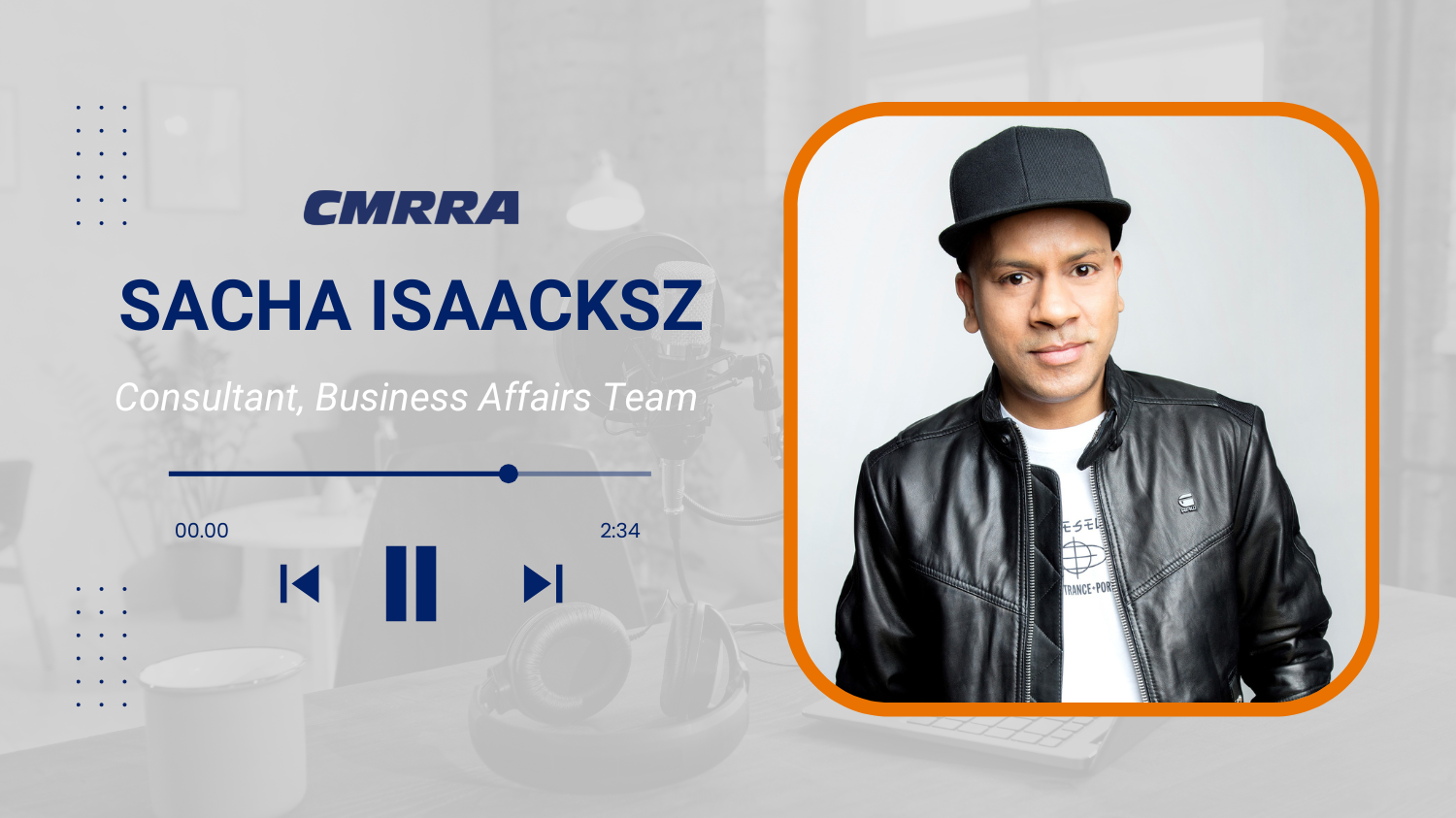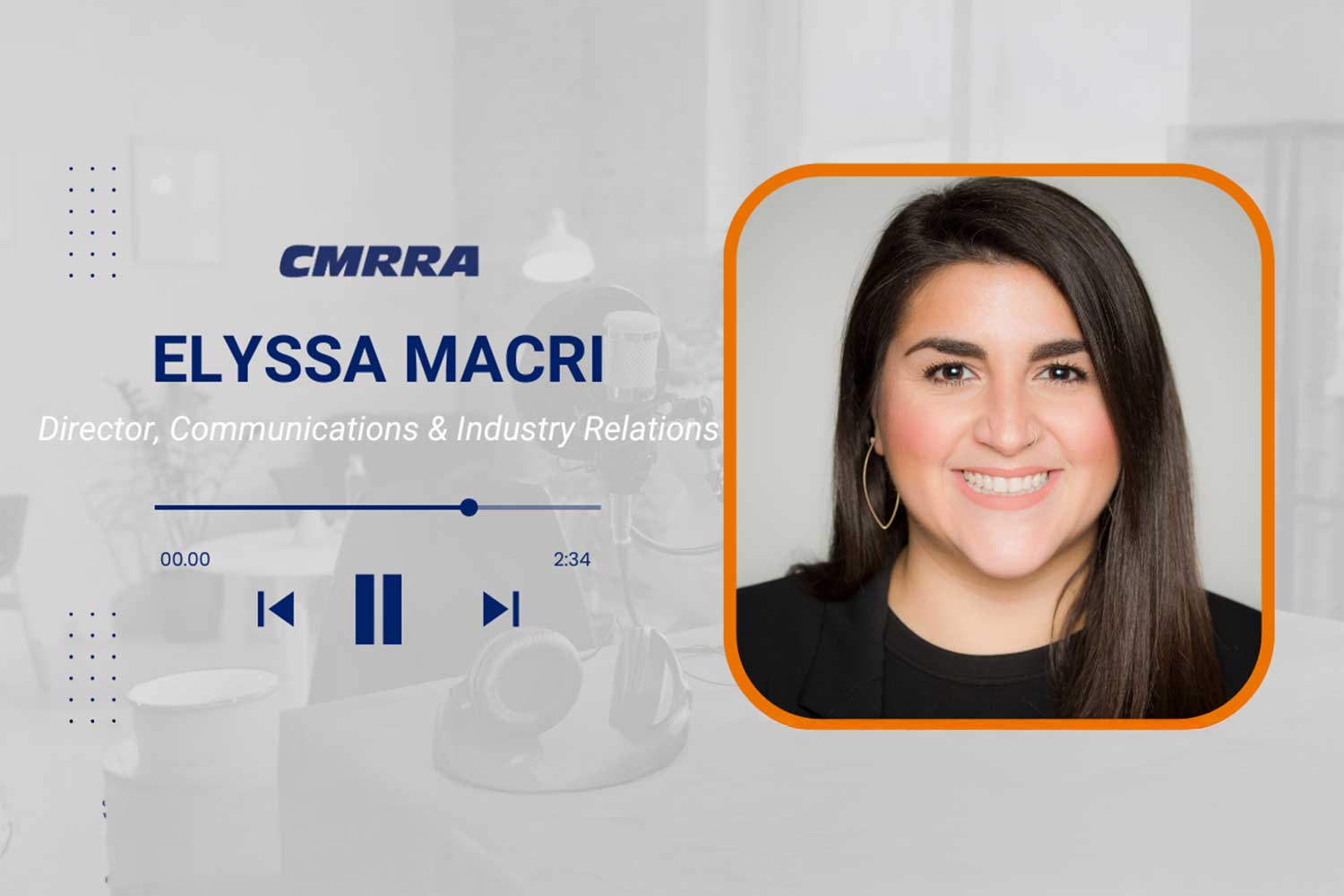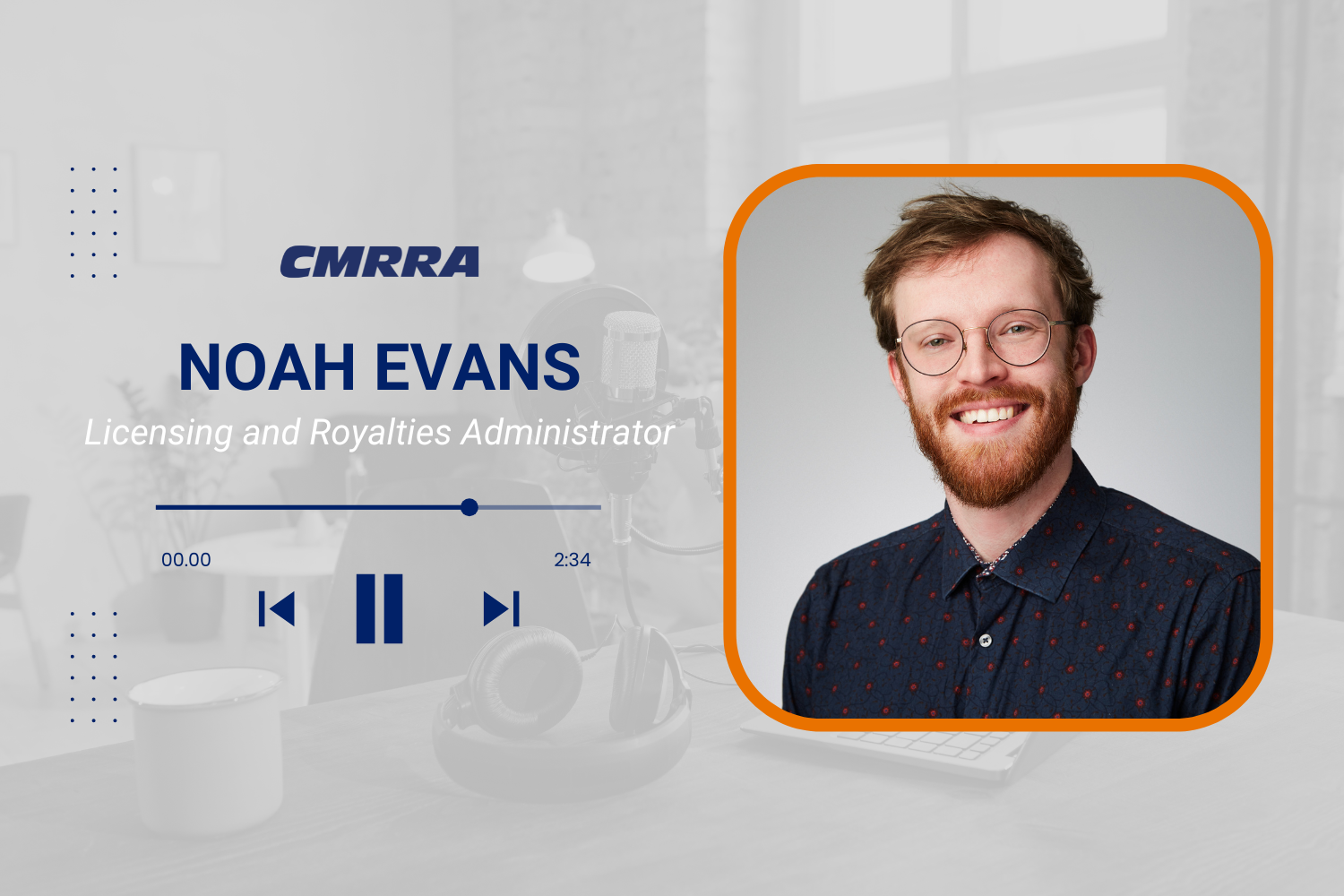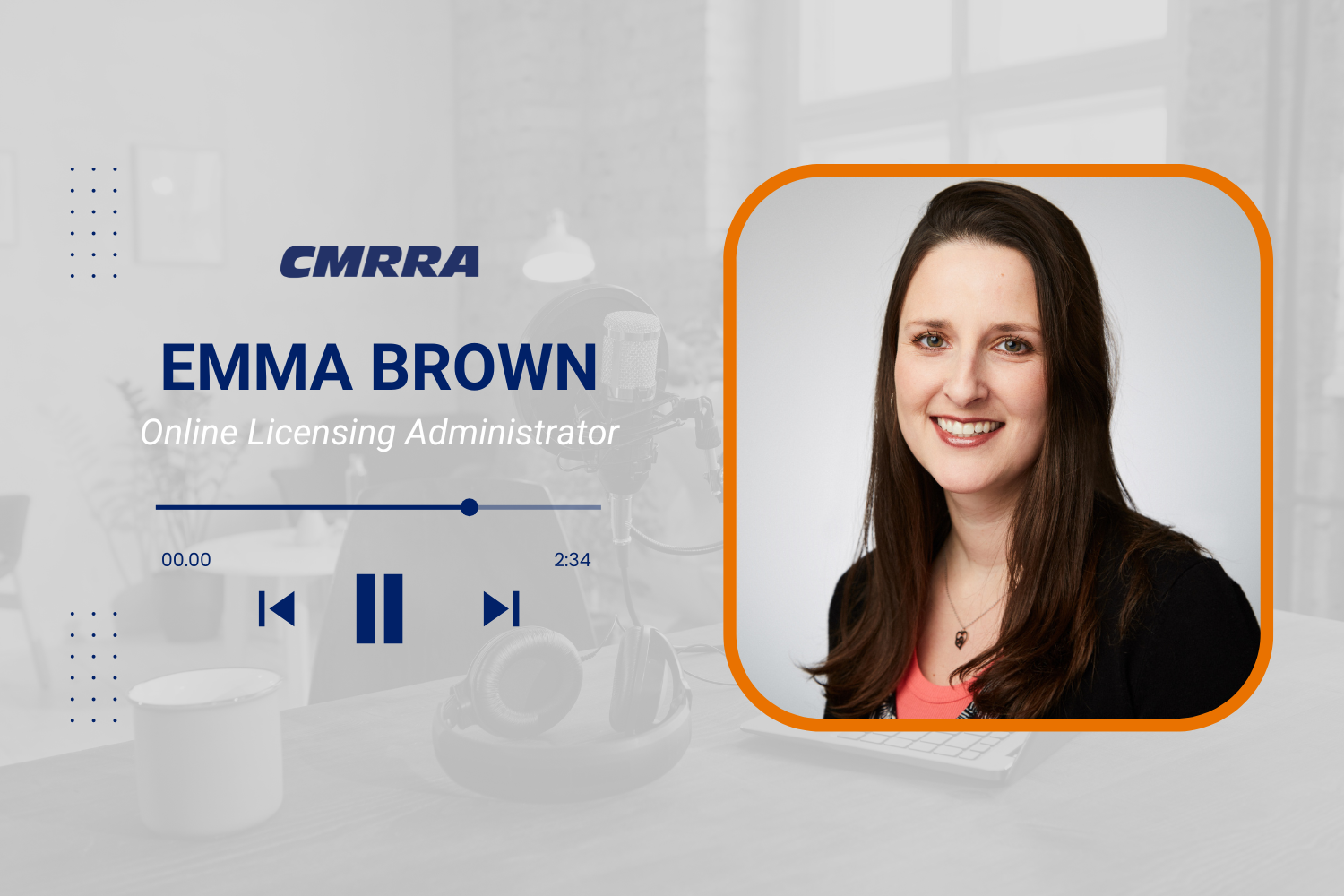This month’s Front of House features Sacha Isaacksz. Sacha embarked on his professional journey fueled by a love for music. He navigates dual paths as both a DJ on the “Roz & Mocha Show” on KiSS 92.5, and as a lawyer in the music industry.
Some people may know you as the DJ from the popular Roz & Mocha Show on KiSS 92.5, but you also work with the CMRRA Business Affairs team. Can you tell us what your role entails and what led you to CMRRA?
Like many of my CMRRA colleagues, I developed a passion for music at an early age. That eventually led me to pursue parallel career paths as a DJ and as a lawyer in the music industry. On the DJ side, I joined the Roz & Mocha Show on KiSS 92.5 in 2010. That year, I also started in my role as Director of Legal and Business Affairs at CONNECT Music Licensing, where I oversaw traditional and digital licensing programs. With that background in music licensing, it felt like a very natural transition to working with CMRRA’s Business Affairs team.
In my current role at CMRRA I work on a wide range of issues that span across legal, contractual, and business domains. This includes assisting the Legal and Business Affairs team with drafting, reviewing, and negotiating licenses and other agreements. I also provide support on tariff-related matters that may arise and work with the team on day-to-day legal matters and special projects.
How do you balance the creative and business sides of your industry positions? Which skills do you find to be transferable between your work as a DJ and your law career?
Although working as a lawyer in the music industry and as a DJ may seem like disparate careers, I have found them complementary in many respects. My legal training undoubtedly helped me to navigate and grow my DJ career, from negotiating for my gigs in my early years in the Toronto club scene, to securing sponsorships for my national DJ tours. On the flipside, my creative and performance background allows me to bring a multifaceted perspective when working with CMRRA’s licensees, clients, and industry stakeholders.
Regarding transferable skills, there are certainly skills that benefit me in both roles. One of the most important is creativity. As a DJ, creativity takes center stage — it’s crucial for producing distinctive remixes, curating engaging sets, and delivering unique mixes on the radio, especially when aiming to captivate an audience and distinguish myself in the continually growing community of DJs.
Likewise, creativity is an indispensable skill for lawyers. Whether it’s developing a legal strategy to deal with a novel issue, or negotiating a deal that provides real benefits to all parties, CMRRA’s Business Affairs team is often tasked with crafting innovative business solutions to meet the needs of our clients and partners.
Research and analytical skills are also very important in each of my industry roles. As a lawyer, I frequently undertake research to address a variety of issues. The analysis stemming from this research often helps inform business decisions. Similarly, when I’m programming weekly radio shows I undertake extensive research using many different sources, including current, historical and trending music charts.
On an individual song level, I research key metrics including song structure, tempo, key, rhythm, mood and more. Continually analyzing this research helps to inform my programing decisions – from which songs make it in to one of my radio mixes, to precisely how and when and the song is mixed into the set.
I have found that many other skills and qualities are beneficial in both roles, including negotiation skills, attention to detail, time management and adaptability. Overall, I think each of my roles has enriched my approach to both legal practice and performing as a DJ.
Are there any key licensing trends that you believe will have an impact on the music industry in the near future?
AI has emerged as a significant factor across numerous industries over the last few years. Its impact on music licensing is an evolving issue, and its potential effects and implications are still unfolding across the industry. Unauthorized AI-generated songs using vocals mimicking those of popular artists like Drake and The Weeknd have garnered millions of views across various platforms. This highlights the fact that intellectual property issues and rights holder protections will have to be carefully considered and addressed as the use of AI in the music industry evolves.
At the same time, I’m optimistic about new licensing approaches related to AI that may develop in the future. There have been other disruptive technologies in the past that ultimately led to new licensing opportunities. For example, we have seen the evolution of the streaming market from the “wild west” of the Napster era to today’s thriving streaming marketplace. I’m hopeful that with proper safeguards and protections in place, AI could lead to new music licensing opportunities for creators.
What advice would you give to aspiring DJs who are looking to break into the industry?
There has been a significant rise in the popularity of DJ culture over the last decade. At the same time, the evolution of DJ gear (both hardware and software) has made DJ’ing more accessible for anyone with an interest in learning the craft. Although it’s easier than ever for newcomers to start DJ’ing as a hobby, it can be challenging to break into the scene and secure gigs.
I would offer three pieces of advice for those looking to break into the industry.
Honing your skills is essential. This includes mastering the technical skills that may apply to your particular musical genre (such as mixing, blending, scratching, and other DJ techniques). It also means learning your tools and understanding the ins and outs of your gear.
Developing your own unique sound is vital. There is now an entire generation that grew up listening to DJ’s at clubs, at stadium tours and at music festivals. Audiences are more nuanced than ever in recognizing which DJ’s and which mixing styles they enjoy, so it’s important to create your own signature sound.
Networking is crucial in the industry. Connecting with other DJ’s, promoters and venues could help land your next gig. While DJ’ing at my campus pub one evening during my university years, it was a conversation with an established Toronto club promoter that eventually led me to a 7-year DJ residency at The Guvernment, one of Toronto’s most legendary venues.
Thinking about becoming a client of CMRRA? Already a client but have questions? Email us at [email protected] and we’ll get you the answers you need.




